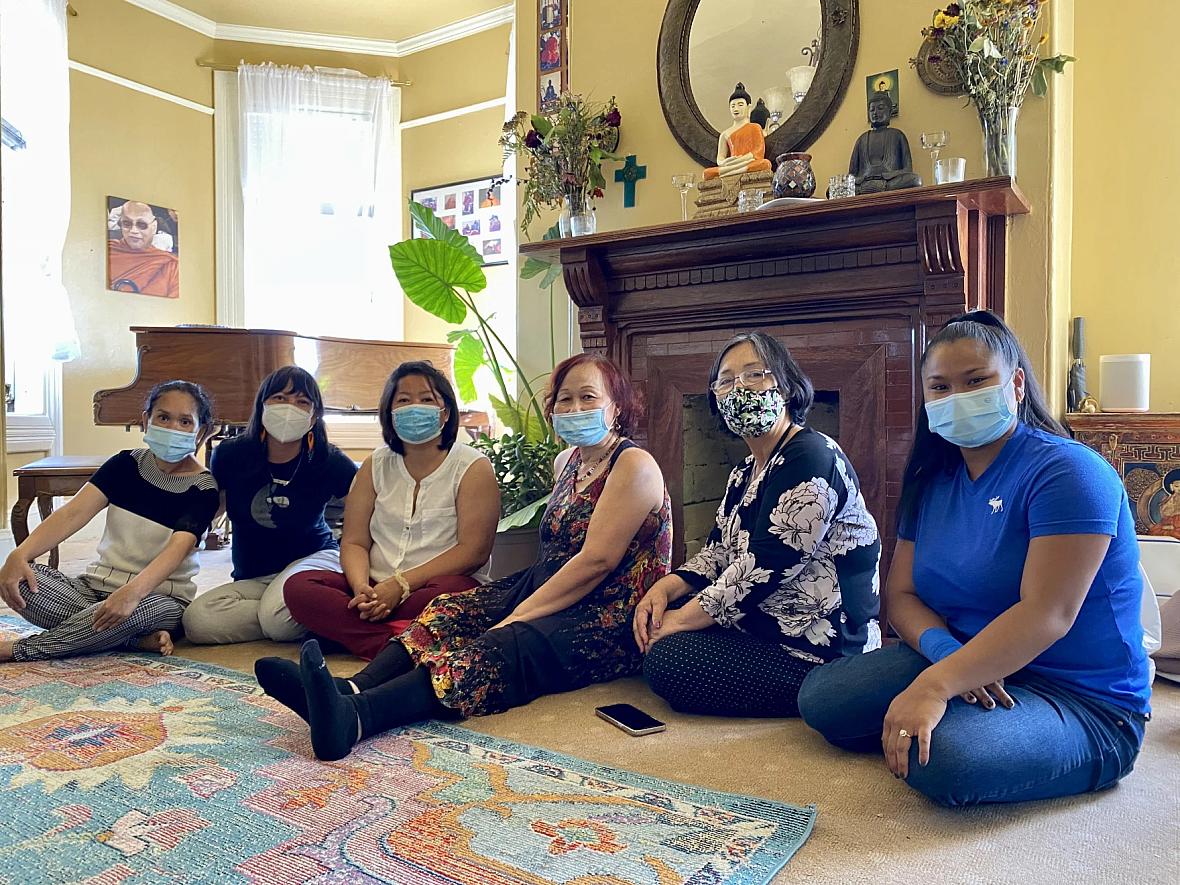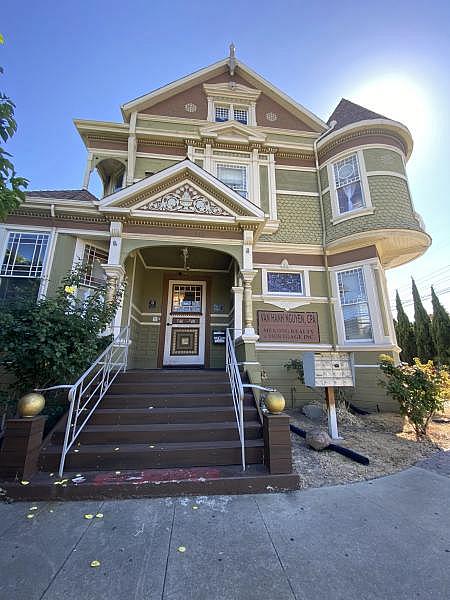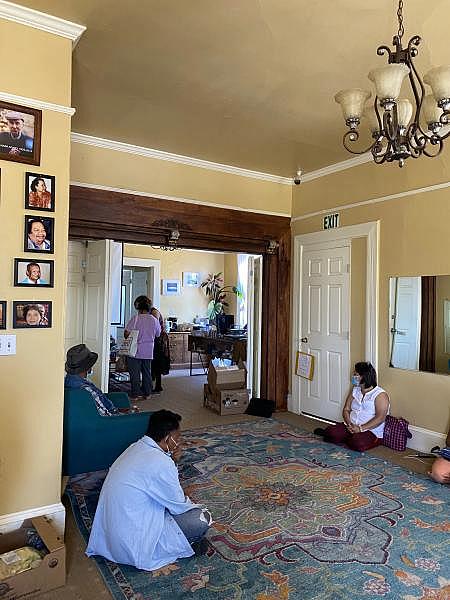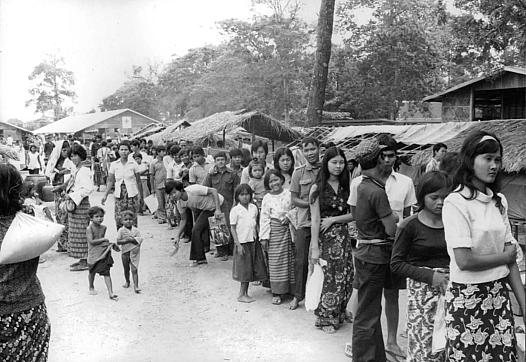A program built by Cambodian refugees offers PTSD support. Participants say it works
This story was originally published in KVPR with support from the 2022 California Fellowship.

Staff members and clients on Clinic Day at the Center for Empowering Refugees and Immigrants (CERI), June 14 in Oakland, Calif.
Soreath Hok / KVPR
CHJ · A Program Built By Cambodian Refugees Offers PTSD Support. Participants Say It Works
This story is part of the series Health and Healing for Cambodian Survivors.
OAKLAND, Calif. — For Cambodians who survived the trauma of the Khmer Rouge genocide, mental health treatment remains a dire need. One program in Oakland is succeeding in reaching those at risk in this refugee community.
One example of that is clinic day at East Oakland’s Center for Empowering Refugees and Immigrants, or CERI for short. Once a month, the non-profit invites two psychiatrists who serve the CERI community pro-bono. Most of the clients here are Cambodian refugees, survivors of the Pol Pot regime.
“This place is like a place of shade, an oasis for Cambodians that need help with healing of the heart or other illnesses,” says Valerie Sous, one of CERI’s longtime Cambodian refugee clients.
Sous has been coming to CERI since it first started nearly 20 years ago. She says CERI has helped so many people like her. “Our brothers and sisters who suffered from the time of the Khmer Rouge, who still have fearful memories from that time of the Khmer Rouge, and suffering from the memories, feel fear - they have this place to come heal those who are heart sick,” she says.
It’s no secret, everyone arriving here today has an appointment to see a psychiatrist, a fact that’s accepted and welcomed, something you don’t often see among the refugee community.
“Oftentimes, when we talk about mental health in our communities, it's still pretty stigmatized,” says Mory Chhom, CERI’s program director for youth and families. She’s also Cambodian and interprets for CERI’s clients.
“I think it really depends on people's level of comfort, but for the most part, we try to create a space and a culture here where it's OK to cry. It's OK to break down. It's OK to talk about the ways in which Cambodian history has affected you,” Chhom says.
But despite the heavy subject matter at hand, today the center is bustling with laughter and chatter as staff members welcome clients and clients greet each other.

A Home for Survivors
Mona Afary, CERI’s founder and executive director, stops to say hello to each person in the room. Her greetings end with a smile and a hug - even for a newcomer like me. She turns to address me.
“You’re Khmer?” Yes, I reply. She asks if I’m related to one of the clients. “No,” I answered. “I’m the reporter from Fresno.” Mona smiles with surprise, “Ohhh!! Soreath, I’m sorry!” she says in a laughing embrace.
Afary, an Iranian immigrant, has worked as a licensed therapist for more than 30 years. She was initially hired by an agency to work with Afghan, Bosnian and Cambodian survivors of war and genocide, but the agency lost its funding. She started CERI in 2005 specifically for Cambodian refugees, after they couldn’t find another agency to help them.
“I'm a psychologist and I started with therapy, but it was clear that they needed more than that,” she says.
The center emphasizes cultural relevance - employing people who speak the same language as the people they serve. The adult programs pair clinical counseling and medication management with peer support groups. Clinic days happen once a month, and the clients also meet once a week to socialize and check in via Zoom. Afary says CERI’s progress has been largely informed by the people it serves.
“One of the first lessons that I learned was that I can't run this agency without partnering with these clients and without their wisdom and their guidance. And so that's how I think, clients from day one, felt that this was theirs, this agency was theirs,” she says.
CERI’s clinic feels like home - it is literally, a historic Victorian building. Entering the waiting room is like going to a typical Southeast Asian household. No shoes inside - those are left piled by the door. Warm colors and soft textures make up the first couch seating area.
But the main living room is bare of furniture, except for a large Persian rug making an open space where elders can sit and socialize.

The living room leads right into the kitchen where the cooking has already begun.
“I’m making chicken porridge and frying sausage,” says Sophal Yin, CERI’s outreach worker and activity coordinator. Everyone calls her Ming or Auntie Sophal. She’s overseeing the kitchen on clinic day, where everyone joins in to prepare food for the clients and also, the doctors.
“They always will make sure that I save the soup for the doctors. Sometimes I say 'Hey, you guys need to eat. You are the elders.’ And they say ‘no,’” Yin says with a laugh.
Because the doctors offer their services for free, CERI’s community considers traditional Khmer food as their way of giving back to them.
Yin says cooking and eating together is also a vital part of healing at CERI. “When we gather together, we always talk about what brought us together. And also we talk about Pol Pot. We talk about how we survive the genocide,” she says.
Each month, the menu changes, a different traditional dish is cooked by different members of the community based on their own knowledge and skill. They’re sharing a taste of home and a part of the past that they’re now learning to live with in the present.
This is part three of KVPR’s five-part series, “Health and Healing for Cambodian Survivors.” Next, we revisit the story of one family of Cambodian refugees in Fresno who survived the trauma of the Khmer Rouge genocide, and dig deeper into their past to show how they’ve rebuilt their lives decades after resettling in the U.S.


